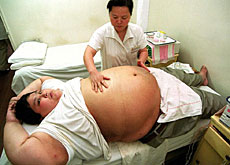
Overeating linked to genes

Willpower may not be enough when it comes to stopping binge eating.
A Swiss-led study has shown that a gene may be partly responsible for the disorder and that it is not simply a question of self-control.
“Willpower is not always important to reduce weight,” said Fritz Horber, the leader of the study at the Hirslanden Clinic in Zurich.
“Some people can get by with willpower; some cannot. I think these patients have a hard time.”
Researchers focused on an appetite-regulating gene called the melanocortin-4 receptor, which had already been linked to obesity in earlier studies.
This gene produces a protein that helps to balance the brain’s hunger-control functions. If it has undergone a mutation, the body feels too much hunger.
The study looked at 469 severely obese white adults in Switzerland, Germany and the United States – a quarter of them binge eaters. Just five per cent of the group had the mutated gene, but all of them were binge eaters.
Researchers say the genetic defect is probably to blame for binge eating among the severely obese – defined as at least 40 kilogrammes overweight.
Obesity
The results come as scientists around the world are attempting to understand the reasons behind the spread of obesity. It is now considered to have reached epidemic proportions in some countries.
In the United States alone, 30 per cent of all adults are obese – up from 14 per cent a quarter of a century ago.
In Switzerland, up to 16 per cent over children between the ages of six and 12 fall into this category.
The increase in the number of people suffering from obesity has been blamed on high-calorie foods and sedentary lifestyles.
Researchers have begun linking several genes to obesity, highlighting heredity as an important underlying factor.
Increasingly, eating disorders are now thought to stem from a cross between lifestyle and genes.
Lifestyle
Horber said that environmental factors almost certainly play a role in binge eating.
“The syndrome tied to this gene is especially important because it is perhaps the most resistant to dieting and exercise,” he explained.
Horber added that binge eaters who took part in the study were relieved when they learned of the genetic disorder behind their compulsion.
Binge eaters, who are not always overweight, often eat in secret and feel guilty about it afterwards, according to medical specialists.
The authors of the study, published in the latest edition of the “New England Journal of Medicine”, said drugs acting like the receptor protein may compensate for the genetic defect.
swissinfo with agencies
The authors of the study say that obese binge eaters may suffer from a genetic defect.
A mutation of the melanocortin-4 receptor gene, which helps control feelings of hunger, may not be fulfilling its appetite-control role.
Researchers included over 450 obese white males in their study, a quarter of them binge eaters.
Only five per cent of the group had the mutated gene, but all were binge eaters.
Scientists say drugs could overcome the defect in the future.

In compliance with the JTI standards
More: SWI swissinfo.ch certified by the Journalism Trust Initiative
















![The four-metre-long painting "Sonntag der Bergbauern" [Sunday of the Mountain Farmers, 1923-24/26] had to be removed by a crane from the German Chancellery in Berlin for the exhibition in Bern.](https://www.swissinfo.ch/content/wp-content/uploads/sites/13/2025/12/01_Pressebild_KirchnerxKirchner.jpg?ver=cb688ed5)














You can find an overview of ongoing debates with our journalists here . Please join us!
If you want to start a conversation about a topic raised in this article or want to report factual errors, email us at english@swissinfo.ch.